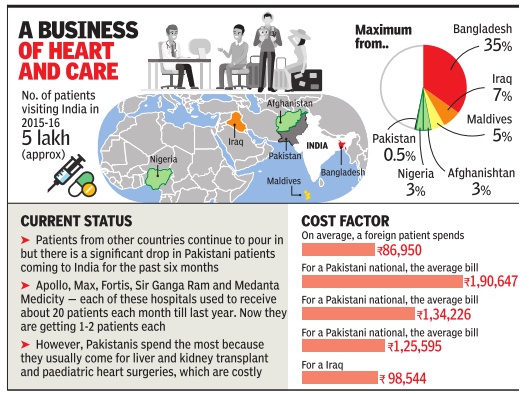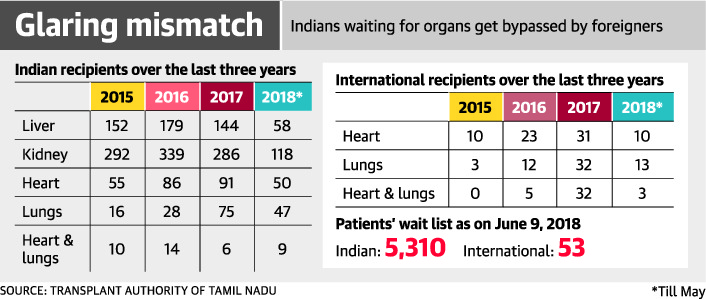Medical tourism: India
This is a collection of articles archived for the excellence of their content. |
Contents |
STATISTICS, YEAR-WISE
2015-16
Please see graphics
Medical tourism in India, as in Jan 2016
Number of patients visiting India in 2015-16 for medical tourism


2015-17/ Number of medical tourists
Yuthika Bhargava, July 23, 2018: The Hindu
A rare combination of advanced facilities, skilled doctors, and low cost of treatment have made India a popular hub of medical tourism, attracting a large number of foreign patients every year. The total number of such visitors in 2017 was 4.95 lakh, Minister of State for Tourism (Independent Charge) K.J. Alphons, said in a written reply to the Lok Sabha.
This number had stood at around 2.34 lakh in 2015, and 4.27 lakh in 2016.
Bangladesh and Afghanistan continued to be the top countries from where the maximum number foreign tourist arrivals (for medical purpose) was seen. In 2017, about 2.21 lakh tourists from Bangladesh are estimated to have come to India for medical reasons, compared to 1.20 lakh in 2015 and 2.10 lakh in 2016.
Likewise, the number of medical tourists from Afghanistan stood at 27,505 in 2015 and 61,231 in 2016. The number declined to 55,681 in 2017. Other countries from where large numbers of medical tourists came to India include Iraq, Oman, Maldives, Yemen, Uzbekistan and Sudan.
Asked about the foreign exchange earned (FEE) from medical tourism, the Minister said the data was not separately available. “However, the provisional estimates of the total FEE through medical tourism during 2015, 2016 and 2017 were ₹1,35,193 crore, ₹1,54,146 crore, and ₹1,77,874 crore, respectively,” he said.
The Niti Aayog has identified medical value travel (MVT) as a major source of foreign exchange earnings. India currently has around 18% of the global medical tourism market. Its medical value travel (MVT) was pegged at $3 billion in 2015, and is estimated to grow at a CAGR of 15%, according to a report by FICCI and IMS Health, a health industry information firm. It has been estimated that by 2020, India’s medical tourism industry could be worth $9 billion, and account for 20% of the global market share.
The report pointed out that in curative care, India was the preferred destination for cardiology, orthopaedics, transplants, and ophthalmology. India also enjoyed high credibility in wellness, preventive, and alternative medicine.
2017/ Chennai- the hub
S. Vijay Kumar, In Chennai, the hearts beat for foreigners, June 12, 2018: The Hindu

International recipients- 2015- May 2018-
(CHENNAI)
From: S. Vijay Kumar, In Chennai, the hearts beat for foreigners, June 12, 2018: The Hindu
International patients get priority in cadaver transplants, bypassing long list of Indians
An organ transplant racket has surfaced in Tamil Nadu. Officials of the Union Ministry of Health & Family Welfare have found that hearts harvested from brain-dead patients were given to foreign nationals, bypassing Indian patients on the waiting list.
In 2017, foreigners got about 25% of all heart transplants in the State and 33% of lung transplants.
Based on a specific input that at least three hearts retrieved from brain-dead patients were given to international patients in recent months in Chennai, the Directorate General of Health Services convened an urgent meeting in New Delhi recently and framed strict guidelines for allocation of organs to foreigners.
“It is difficult to digest that Indian hearts are not matching with our own Indian patients but matching with foreigners. How’s it possible... It seems that Indian money is not matching with foreigners’ money. Really sorry to write that we are so greedy (that) we don’t bother to help poor Indian patients and (are) trying to manipulate (the waiting list) for foreigners,” Prof. Vimal Bhandari, Director, National Organ and Tissue Transplant Organisation (NOTTO), said in a message on a WhatsApp group set up for the purpose of organ allocation.
The group comprises officials of the Tamil Nadu Transplant Authority and representatives of all government hospitals and major private hospitals (which are licensed for organ transplantation).
NOTTO, which functions under the Ministry of Health & Family Welfare, is an all-India apex body for coordination and networking for procurement and distribution of organs/tissues and transplantation.
Prof. Bhandari made the comment after learning that hearts and lungs harvested from brain-dead patients were given to foreign nationals admitted to corporate hospitals. Speaking to The Hindu, he said he came to know of something “fishy” in the way hearts were allocated to foreigners in Chennai. The protocol is that an organ should first be offered to an Indian. If no Indian is available, an NRI should be considered. The question of an international patient arises only when both decline an organ offer.
Source countries
Pakistan
2019-2024
DurgeshNandan Jha, April 29, 2025: The Times of India

From: DurgeshNandan Jha, April 29, 2025: The Times of India
New Delhi : Security tensions and terror attacks on India have been taking a heavy toll on Pakistani patients desperate for advanced treatment across the border with the issuance of visas crashing from over 1,600 in 2016 to barely over 200 in 2024. It could shudder to a halt altogether after the latest terrorist atrocity.
A significant disruption came in 2017 with the clash over Indian citizen Kulbhushan Jadhav, whom Pakistan had convicted as an Indian spy, refusing to release him despite a fullblown diplomatic crisis and India urging his release.
The medical visas issued to Pakistani nationals in 2016 were 1,678, but the number fell sharply after the Jadhav episode.
However, things got complicated further in 2019 as India was rocked by the Pulwama terror attack which brought the two countries to the brink of an armed confrontation. Between 2019 and 2024, data available with TOI shows, only 1,228 medical visas were issued to Pakistani nationals — 554 in 2019, 97 in 2020, 96 in 2021, 145 in 2022, 111 in 2023 and 225 in 2024.
In the wake of fresh escalation in the already fraught relationship following the Pahalgam terror attack, healthcare industry experts say the latest tit-fortat measures between the two countries may sound the death of medical tourism from Pakistan to India, at least in the foreseeable future. Medical visas issued to Pakistani nationals will be valid only till 29 April 2025, the ministry of external affairs announced last Thursday in the wake of the Pahalgam attack.
In the aftermath of sentencing of Jadhav in 2017, govt had announced new rules for issuance of medical visas to Pakistani nations which mandated a recommendation letter from adviser to the Prime Minister on Foreign Affairs, to process genuine and urgent cases.
“Patients from Pakistan used to visit India mostly for advanced surgeries such as liver transplant and treatment of birth defects that aren't widely available in their country and would cost a lot in other developed nations such as the US or the UK. But in the last six to seven years, the numbers have reduced drastically and now after the Pahalgam incident it is unlikely to go up anytime soon,” said an official of a medical travel assistance company.
“Until 8-9 years ago, many patients from Pakistan came to us for liver transplantation every month. However, their numbers have dwindled over time. We have transplanted just two patients from there in the past year – the last one seven months ago,” Dr Arvinder Soin, chairman and chief surgeon, Medanta Institute of Liver Transplantation, said.
A source at Fortis healthcare also confirmed that Pakistani nationals visiting their hospitals for treatment has reduced significantly over the years. “We have only had a few Pakistani embassy officials visiting us for routine health issues recently,” the source said. Indraprastha Apollo Hospital in Delhi said they do not have any Pakistani patient under treatment at the moment.